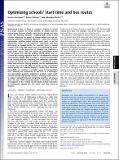| dc.contributor.author | Bertsimas, Dimitris J | |
| dc.contributor.author | Delarue, Arthur | |
| dc.contributor.author | Martin, Sebastien | |
| dc.date.accessioned | 2021-02-18T22:07:22Z | |
| dc.date.available | 2021-02-18T22:07:22Z | |
| dc.date.issued | 2019-03 | |
| dc.date.submitted | 2018-07 | |
| dc.identifier.issn | 0027-8424 | |
| dc.identifier.issn | 1091-6490 | |
| dc.identifier.uri | https://hdl.handle.net/1721.1/129829 | |
| dc.description.abstract | Maintaining a fleet of buses to transport students to school is a major expense for school districts. To reduce costs by reusing buses between schools, many districts spread start times across the morning. However, assigning each school a time involves estimating the impact on transportation costs and reconciling additional competing objectives. Facing this intricate optimization problem, school districts must resort to ad hoc approaches, which can be expensive, inequitable, and even detrimental to student health. For example, there is medical evidence that early high school starts are impacting the development of an entire generation of students and constitute a major public health crisis. We present an optimization model for the school time selection problem (STSP), which relies on a school bus routing algorithm that we call biobjective routing decomposition (BiRD). BiRD leverages a natural decomposition of the routing problem, computing and combining subproblem solutions via mixed integer optimization. It significantly outperforms state-of-the-art routing methods, and its implementation in Boston has led to $5 million in yearly savings, maintaining service quality for students despite a 50-bus fleet reduction. Using BiRD, we construct a tractable proxy to transportation costs, allowing the formulation of the STSP as a multiobjective generalized quadratic assignment problem. Local search methods provide high-quality solutions, allowing school districts to explore tradeoffs between competing priorities and choose times that best fulfill community needs. In December 2017, the development of this method led the Boston School Committee to unanimously approve the first school start time reform in 30 years. | en_US |
| dc.language.iso | en | |
| dc.publisher | National Academy of Sciences | en_US |
| dc.relation.isversionof | http://dx.doi.org/10.1073/pnas.1811462116 | en_US |
| dc.rights | Article is made available in accordance with the publisher's policy and may be subject to US copyright law. Please refer to the publisher's site for terms of use. | en_US |
| dc.source | PNAS | en_US |
| dc.title | Optimizing schools’ start time and bus routes | en_US |
| dc.type | Article | en_US |
| dc.identifier.citation | Bertsimas, Dimitris et al. "Optimizing schools’ start time and bus routes." Proceedings of the National Academy of Sciences 116, 13 (March 2019): 5943-5948 © 2019 National Academy of Sciences | en_US |
| dc.contributor.department | Massachusetts Institute of Technology. Operations Research Center | en_US |
| dc.contributor.department | Sloan School of Management | en_US |
| dc.relation.journal | Proceedings of the National Academy of Sciences | en_US |
| dc.eprint.version | Final published version | en_US |
| dc.type.uri | http://purl.org/eprint/type/JournalArticle | en_US |
| eprint.status | http://purl.org/eprint/status/PeerReviewed | en_US |
| dc.date.updated | 2021-02-05T16:57:32Z | |
| dspace.orderedauthors | Bertsimas, D; Delarue, A; Martin, S | en_US |
| dspace.date.submission | 2021-02-05T16:57:35Z | |
| mit.journal.volume | 116 | en_US |
| mit.journal.issue | 13 | en_US |
| mit.license | PUBLISHER_POLICY | |
| mit.metadata.status | Complete | |
